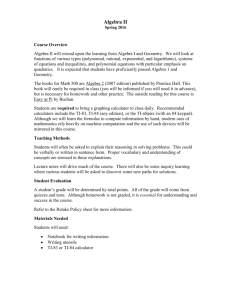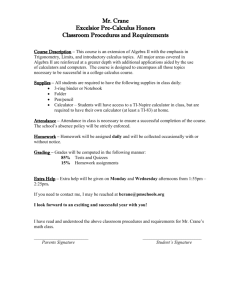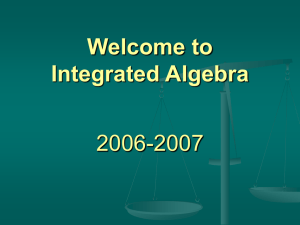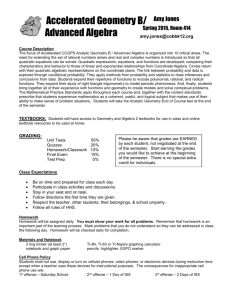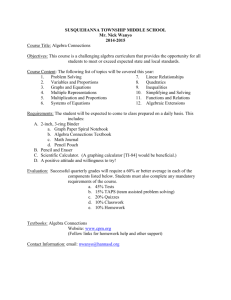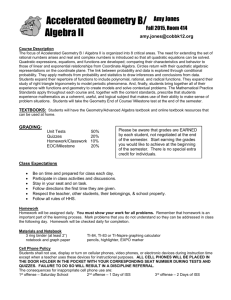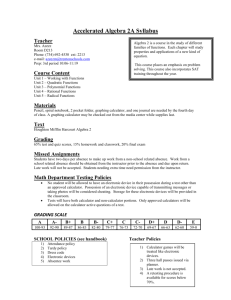Year long course with 2 math credits and 1 elective credit possible
advertisement
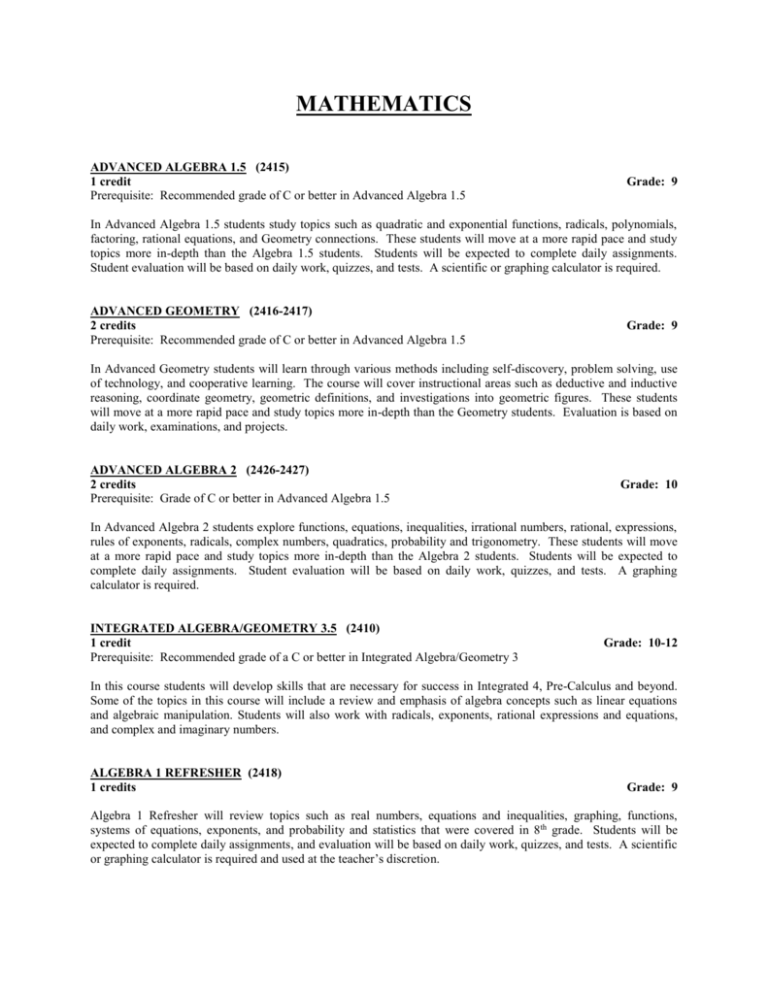
MATHEMATICS ADVANCED ALGEBRA 1.5 (2415) 1 credit Prerequisite: Recommended grade of C or better in Advanced Algebra 1.5 Grade: 9 In Advanced Algebra 1.5 students study topics such as quadratic and exponential functions, radicals, polynomials, factoring, rational equations, and Geometry connections. These students will move at a more rapid pace and study topics more in-depth than the Algebra 1.5 students. Students will be expected to complete daily assignments. Student evaluation will be based on daily work, quizzes, and tests. A scientific or graphing calculator is required. ADVANCED GEOMETRY (2416-2417) 2 credits Prerequisite: Recommended grade of C or better in Advanced Algebra 1.5 Grade: 9 In Advanced Geometry students will learn through various methods including self-discovery, problem solving, use of technology, and cooperative learning. The course will cover instructional areas such as deductive and inductive reasoning, coordinate geometry, geometric definitions, and investigations into geometric figures. These students will move at a more rapid pace and study topics more in-depth than the Geometry students. Evaluation is based on daily work, examinations, and projects. ADVANCED ALGEBRA 2 (2426-2427) 2 credits Prerequisite: Grade of C or better in Advanced Algebra 1.5 Grade: 10 In Advanced Algebra 2 students explore functions, equations, inequalities, irrational numbers, rational, expressions, rules of exponents, radicals, complex numbers, quadratics, probability and trigonometry. These students will move at a more rapid pace and study topics more in-depth than the Algebra 2 students. Students will be expected to complete daily assignments. Student evaluation will be based on daily work, quizzes, and tests. A graphing calculator is required. INTEGRATED ALGEBRA/GEOMETRY 3.5 (2410) 1 credit Prerequisite: Recommended grade of a C or better in Integrated Algebra/Geometry 3 Grade: 10-12 In this course students will develop skills that are necessary for success in Integrated 4, Pre-Calculus and beyond. Some of the topics in this course will include a review and emphasis of algebra concepts such as linear equations and algebraic manipulation. Students will also work with radicals, exponents, rational expressions and equations, and complex and imaginary numbers. ALGEBRA 1 REFRESHER (2418) 1 credits Grade: 9 Algebra 1 Refresher will review topics such as real numbers, equations and inequalities, graphing, functions, systems of equations, exponents, and probability and statistics that were covered in 8th grade. Students will be expected to complete daily assignments, and evaluation will be based on daily work, quizzes, and tests. A scientific or graphing calculator is required and used at the teacher’s discretion. ALGEBRA 1.5 (2412-2413) 2 credits Prerequisite: Recommended grade of C or better in Algebra 1 Grade: 9-12 In Algebra l.5 students study topics such as quadratic and exponential functions, radicals, polynomials, factoring, rational equations, and Geometry connections. Students will be expected to complete daily assignments. Student evaluation will be based on daily work, quizzes, and tests. A scientific or graphing calculator is required. GEOMETRY (2430-2431) 2 credits Prerequisite: Algebra 1.5 Grade: 9-12 In Geometry students will learn through various methods including self-discovery, problem solving, use of technology, and cooperative learning. The course will cover instructional areas such as deductive and inductive reasoning coordinate geometry, geometric definitions, properties of triangles, properties of lines, and investigations into geometric figures. A scientific or graphing calculator is required and used at the teacher’s discretion. ALGEBRA 2 (2424-2425) 2 credits Prerequisite: Recommended grade of C or better in Algebra 1.5 and Geometry Grade: 10-12 In Algebra 2 students explore functions, equations, and inequalities, irrational numbers, complex numbers, quadratics, probability and trigonometry. Students will be expected to complete daily assignments. Student evaluation will be based on daily work, quizzes and tests. A graphing calculator (TI-83 or equivalent) is highly recommended. PROBABILITY AND STATISTICS 1 (2450) 1 credit Prerequisite: Algebra 2 or Integrated Algebra/Geometry 3 Grade: 11-12 Probability and Statistics 1 is a junior/senior level class that teaches probability and statistical concepts. These concepts include measures of center, correlation and causation between events, independence of events, graphical displays, summation notation and rules of probability. Evaluation will be based on tests, quizzes, daily work and projects. A graphing calculator (TI-83 or equivalent) is highly recommended for this course. PROBABILITY AND STATISTICS 2 (2451) 1 credit Prerequisite: Probability and Statistics 1 Grade: 11-12 Probability and Statistics 2 is a junior/senior level class that teaches probability and statistical concepts. This class is a continuation of Probability and Statistics 1. Students who wish to have a better background in Probability and Statistics should take both 1 and 2 (recommended). Evaluation will be based on tests, quizzes, daily work and projects. A graphing calculator (TI-83 or equivalent) is required. PRE-CALCULUS (2460-2461) 2 credits Prerequisite: Completion of Algebra 2 with a grade of C or better Grade: 11-12 Pre-Calculus is a high-level math course designed for the math student who has been successful in previous mathematics courses. Pre-Calc is taught at a level which prepares students for Calculus I. Students will be expected to complete daily assignments. Students will study linear, quadratic, polynomial, exponential, and logarithmic functions and trigonometry. If time permits conic sections will be covered. Student evaluation will be based on daily work, quizzes, and tests. A graphing calculator is required (model TI-83 or equivalent). CALCULUS 1 (2470) 1 credit Grade: 11-12 Prerequisite: Completion of Pre-Calculus or Integrated Algebra/Geometry 4 with a grade of C or better Calculus is designed as a preparation course for college calculus. Students will study functions, limits, continuity, differentiation, anti-differentiation with applications, and an introduction of integrals. Students are evaluated through daily work, examinations and possible projects. A graphing calculator is required (model TI-83 or equivalent). ADVANCED PLACEMENT CALCULUS (2472-2473) 2 credits Prerequisite: Calculus 1 Grade: 11-12 This class is to be taken following the successful completion of Calculus 1. AP Calculus subject matter will include anti-differentiation, integration of various functions, logarithmic differentiation and integration, and more. A graphing calculator is required. Near the end of the school year, students will have the option to take a test given by the College Board which allows them the possibility of earning college credits. The following two courses are not recommended for a student pursuing a four year college degree. These courses move at a slower pace and registration is by math teacher recommendation only. A scientific or graphing calculator (TI-83 or equivalent) is required. Students will meet the Minnesota Math Standards and prepare for the Minnesota Comprehensive Assessment exam. ALGEBRA CONCEPTS (2452, 2453, 2454) 3 credits (Year long course with 2 math credits and 1 elective credit possible) Grade: 9-10 In Algebra Concepts, students will study Algebraic concepts from Algebra 1 as well as Algebra 1.5. This class will prepare students for the GRAD and Minnesota Comprehensive Assessment exam. If time permits, additional concepts will be covered. Student evaluation is based on daily work, quizzes, tests, and possible projects. A scientific or graphing calculator is required and used at the teacher’s discretion. GEOMETRY CONCEPTS ( 2456, 2457, 2458) 3 credits (Year long course with 2 math credits and 1 elective credit possible) Grade: 10-11 In Geometry Concepts, students will study Geometry concepts through various methods including self-discovery, cooperative learning and problem solving. Topics include geometry terminology, inductive reasoning, patterns and sequences, polygons, angle measure, area, volume, and similarity. If time permits, additional concepts will be covered. Student evaluation is based on daily work, quizzes, tests, and possible projects. A scientific or graphing calculator is required and used at the teacher’s discretion.
